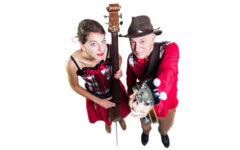
It’s somewhat intriguing when a band describes its sound as “mountain music from the flat country.” It’s even more unusual when they call themselves as Hills of Belgium, given that the country they’re referring to has no hills, and is, instead, one of the countries of northeast Europe that’s known as The Lowlands.
Given that bit of irony, it’s a credit to the band that goes by that name — specifically Jérémie Fraboni, who contributes clawhammer banjo and vocals and his musical partner Lorcan Fahy, who plays the fiddle and shares the vocals — that the devotion to their muse is such that they tap into a tradition spawned in the upper realms of Appalachia.
Fahy describes their sound as, “Different colors of old time music, from round peak fiddle tunes to modern string bands of the early 20th century.” Indeed, when asked to list the duo’s influences, he provides a roll call of seminal grassicana auteurs, specifically, so-called “old musicians like Roscoe Holcomb, Tommy Jarrell, John Salyer, Fred Cockerham, Clarence Ashley, and Clyde Davenport,” many of whom would require further investigation by even the most dedicated bluegrass disciple. He supplements that list by name checking a crop of more current musicians, among them, Stephanie Coleman and Nora Brown, Richie & Rosie, Bruce Molsky, and Rayna Gellert.
That dedication to cause is amply affirmed on the duo’s first offering, an EP tellingly titled Hills of Mexico that was released in mid November and can currently found on bandcamp. It not only includes the title track, but also offerings of such vintage variety as John Salyer’s Set, Old Kimball, Cluck Old Hen, and Roustabout. True to form, each selection boasts an air of assured authenticity. Their folk roots are clearly evident in every note and nuance, somewhat sparingly performed and yet shared with a full finesse found within the context of archival instrumentation.
“We mainly play traditional music and we make it our own,” Fahy says simply. A listen to the new EP confirms that assessment.
Further evidence can be found on Hills of Belgium’s recently released video, which can be viewed on YouTube.
Asked about the group’s early origins, Fahy explains that he and Fraboni first met around a table in a local pub while participating in an old time jam session in Brussels. The connection seemed assured from the get-go, and although their band is still in its infancy and has yet to tour, they’ve managed to perform at various places in their native Belgium. Naturally, they hope to take their music elsewhere as soon as it’s feasible to do so.
While they’re still building a fan following, Fahy says he’s satisfied with the reaction they’ve received thus far. “People here don’t know anything about this music,” he insists. “They think we come from another country. Still, it’s really surprising and refreshing to them. The feedback we get is great.”
According to Fahy, there’s a good explanation why the feedback has been as positive as it’s been thus far. He attributes it to a need for cultural connection, something that’s missing at home and elsewhere as well.
“We play old time music, but we believe it’s well-received because it’s also authentic,” he muses. “We need music that connects us with tradition, especially in Belgium, where we’ve lost most of our own.”
That’s a scenario that’s not necessarily limited to their own environs of course. It’s a malady that often appears all too common elsewhere in the world as well, including here at home. Given that predicament, a band like Hills of Belgium ought to inspire anyone with a desire to tap into tradition and set their sights higher.







